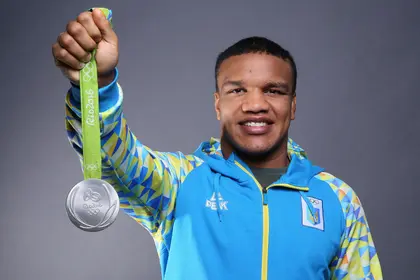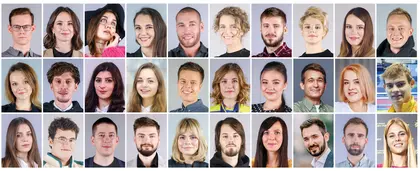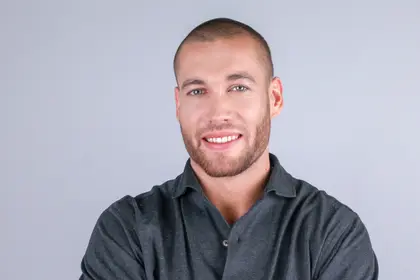Name: Zhan Beleniuk
Age: 27
Education: National University of Ukraine on Physical Education
Profession: Greco-Roman wrestling champion
Did you know? Beleniuk has been a junior lieutenant of the Ukrainian Army since 2017
Zhan Beleniuk entered the world of Greco-Roman wrestling in 2000, when he was 9. Sixteen years later, Beleniuk won a silver medal in the up to 85 kilograms category of Greco-Roman Wrestling at the 2016 Summer Olympics in Rio. And now at 27, he’s known both great triumph and great tragedy.
- Receive the latest Ukraine news bulletins for today.
- Find the latest Ukraine news published as of today.
JOIN US ON TELEGRAM
Follow our coverage of the war on the @Kyivpost_official.
At age 11, his father, Vincent Ndagijimana was killed in a military conflict in Rwanda. He was a pilot from the Hutu ethnic group. He met Zhan’s mother, Ukrainian Svitlana Beleniuk, in the 1980s while studying at Kyiv National Aviation University.
His father was called up for military service and left Ukraine in the 1990s. “It was his duty, so he had to go,” Beleniuk said briefly. From the 1960s until 2009, Rwanda was riven by military conflict, revolution, a civil war and genocide. Beleniuk visited his father’s grave in 2017, when he met with the African part of his family in Rwanda.
Beleniuk turned professional wrestler in 2010. “I just felt it was my thing, and I like it a lot,” Beleniuk told the Kyiv Post.
Since then the champion has won medals in three world and three European championships. He took silver in the European Games in Baku, Azerbaijan, in 2015, and a year later he did the same at the 2016 Rio Olympics, when he was also named wrestler of the year by International Wrestling Federation.

Yuliya Levchenko: Star athlete conquers international competitions
This year, Ukrainian authorities awarded him an apartment in Kyiv, which he had earned for one of his victories in 2015. A modest and soft-spoken athlete, Beleniuk became a prominent critic of the Ukrainian government, calling for more financing and better training conditions for athletes who represent Ukraine on the world stage.
“Wrestlers do not need much equipment for training — only a mat, a thing our government can provide. But we have only one training base where more than eight athletes can train all at once,” Beleniuk said. “I wish the government started the construction of new arenas for us, because we have enormous potential in Ukraine.”
In Ukraine, Olympic champions do not lead a lavish lifestyle. Top athletes earn less than $300 in monthly wages from the Ministry of Youth and Sports. The poor conditions lead athletes to join other teams and even change citizenship to represent other nations.
“I’ve had offers from China, Azerbaijan, and many other countries, where the government finances wrestling much better,” Beleniuk said. But Beleniuk decided to wrestle for Ukraine, “not because I am such a patriot. I just belong here. The other team would never fully accept me,” Beleniuk said. “And people who have always supported and believed in me are all in Ukraine. I don’t want to betray them.”
You can also highlight the text and press Ctrl + Enter







